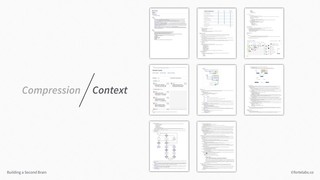Edited, memorised or added to reading queue
on 16-Sep-2022 (Fri)
Do you want BuboFlash to help you learning these things? Click here to log in or create user.
| status | not read | reprioritisations | ||
|---|---|---|---|---|
| last reprioritisation on | suggested re-reading day | |||
| started reading on | finished reading on |
Progressive Summarization: A Practical Technique for Designing Discoverable Notes - Forte Labs
you have to compress it, like communicating a huge amount of life experience in a wise saying. But in doing so, you lose a lot of the context that made that wisdom valuable in the first place. <span>Let’s look at some examples. <img data-lazy-fallback="1" class="progressiveMedia-image js-progressiveMedia-image aligncenter" src="https://i0.wp.com/cdn-images-1.medium.com/max/800/1*dq44FqjDaLiXwB9WvRXRyw.jpeg?w=900&ssl=1" data-src="https://i0.wp.com/cdn-images-1.medium.com/max/800/1*dq44FqjDaLiXwB9WvRXRyw.jpeg?w=900&ssl=1" data-recalc-dims="1" /> If we compress a note too much, in other words, we make a summary that is too brief, we lose the context and it loses all meaning. In the note above, for example, the information it contains is highly discoverable — I can get the gist of it with just a glance. But if I come across this note a year from now, I’ll have no idea what it means or why it’s important. It’s too compressed. But we can go too far in the opposite direction too. If we make something totally understandable, in other words, if we include every little detail and bit of context, it loses its discoverability. <img data-lazy-fallback="1" class="progressiveMedia-image js-progressiveMedia-image aligncenter" src="https://i0.wp.com/cdn-images-1.medium.com/max/800/1*T6oXDnZWMNUCPN6uR9ywUA.jpeg?
| status | not read | reprioritisations | ||
|---|---|---|---|---|
| last reprioritisation on | suggested re-reading day | |||
| started reading on | finished reading on |
archive.ph
to be expected. Those who have simply must do a better job explaining the contours of that debate to others. Advertisement Now is as good a time as any for me to do a little of that explaining. <span>Mr Drum writes: Matt [Yglesias] is right that one of the theoretical virtues of NGDP targeting is that it combines both employment and inflation into a single metric, which would make this question moot for policymakers, but it unquestionably does imply that during recessions the Fed would tolerate higher inflation. I think that's a good thing (as does Matt); [WSJ writer Evans doesn't]. But it's certainly a key issue that deserves plenty of public discussion. Let's slow down here. Does an NGDP targ
| status | not read | reprioritisations | ||
|---|---|---|---|---|
| last reprioritisation on | suggested re-reading day | |||
| started reading on | finished reading on |
archive.ph
hing similar. During a period of catch-up, inflation would probably run above the desired rate, as would real output growth. This actually isn't even inconsistent with an inflation-rate target. <span>A central bank actually targeting an inflation rate should react to deviations above and below target similarly, suggesting that the Fed should be no more aggressive in fighting above-normal inflation than it was in fighting below-normal inflation; 2% on average is good enough. A period of catch-up NGDP growth and inflation is really only inconsistent with a policy of steady opportunistic disinflation or, to the extent that the t
| status | not read | reprioritisations | ||
|---|---|---|---|---|
| last reprioritisation on | suggested re-reading day | |||
| started reading on | finished reading on |
archive.ph
f 2008, but they forget how slow the central bank was to react to what was obviously a precipitous decline in the macroeconomy. The fed funds rate stayed at 2% from April until October of 2008. <span>The Fed didn't ramp up its initial asset purchase programme above $1 trillion until March of 2009, at which point the economy had already lost some 6m jobs. Why the delay? One data point worth noting: the monthly core inflation rate was positive throughout 2008 and 2009. NGDP growth, by contrast, was already negative in the third quarter of 2008, and was sharply negative in the fourth quarter of that year, when total spending in the economy shrank at an 8.4% annual pace. A central bank with an explicit NGDP level target would have faced (appropriately) intense pressure to do much more much sooner than one with the Fed's present, vague focus on an inflation target as a means to broader macroeconomic stability. Advertisement Now, in a situation in which a central bank has credibly established an NGDP target, recessions would by definition be due to real shocks. In those cases, maintaining the
| status | not read | reprioritisations | ||
|---|---|---|---|---|
| last reprioritisation on | suggested re-reading day | |||
| started reading on | finished reading on |
archive.ph
as credibly established an NGDP target, recessions would by definition be due to real shocks. In those cases, maintaining the target would mean higher inflation to go with lower real growth. So <span>if the American economy is hit by a real shock, an NGDP target might mean inflation at 5% and zero real growth, rather than what we might observe today—inflation around 3% and a drop in real growth of perhaps 2%. I'm happy to have a debate about which Americans are likely to prefer, provided that we stipulate that in the meantime, the NGDP target is also preventing major episodes of cyclical une
| status | not read | reprioritisations | ||
|---|---|---|---|---|
| last reprioritisation on | suggested re-reading day | |||
| started reading on | finished reading on |
archive.ph
NGDP is expected to be too high, rates go up; too low, and rates go down. At the zero bound, the tools are the same ones the Fed has been using or saying it could use for the past three years. <span>If you think the Fed can affect inflation, you think the Fed can affect NGDP; that's all there is to it. Now, you might argue that the Fed can't affect inflation, but that's an extremely difficult position to reconcile against recent data. Mr Drum closes: Finding some kind of mechanical mo

